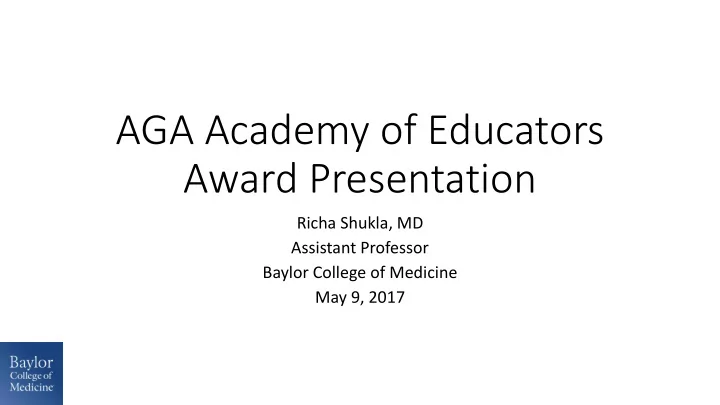

AGA Academy of Educators Award Presentation Richa Shukla, MD Assistant Professor Baylor College of Medicine May 9, 2017
Background • Current endoscopic training based on apprenticeship model (“see one, do one”) • Challenges in current training model • Subjectivity in training • Difficulty in integrating technical and cognitive aspects (i.e. interpretation of findings) of endoscopy at early stages of training
Evolving Competency Expectations • ACGME has outlined milestone- based expectations to achieve competency in Internal Medicine sub-specialties • In order to ensure quality metrics are met, ASGE created Assessment of Competency in Endoscopy (ACE) tool Sedlack et al Gastrointest Endosc. 2014 Jan;79(1):1-7
Hypothesis and Validation • Novice endoscopists, i.e. first year fellows, will show improvement in confidence and competency with a novel, smartphone based endoscopy training application (supplementing standard training approach) • Feasibility testing performed with assistance of 6 first year GI fellows at Baylor College of Medicine
Results • After use of the smartphone application, all fellows showed improvement in confidence in the following areas: • Obtaining informed consent • Esophageal intubation • Identification of gastric landmarks (greater/lesser curvature, antrum etc.) • Entering second portion of duodenum • Identifying and managing post-procedural complications
Results 5/6 fellows reported they were somewhat to much more likely to • use a smartphone app to help identify abnormal GI pathology and to obtain information on treatment/management guidelines 4/6 fellows reported increased confidence with performing upper • endoscopy 5/6 fellows reported increased confidence in their ability to • identify abnormal pathology All fellows demonstrated improvement in objective questions • measuring competency with interpreting EGD findings
Conclusions • Fellows showed improvement in cognitive and technical aspects of upper endoscopy with use of a smartphone application • Fellows were receptive to the use of such a training tool • There is a need to develop novel training tools to adapt to learning styles of incoming novice endoscopists.
Future Directions • Expansion to iOS • Creation of augmented and virtual reality partner tools to expand the range of simulation-based training tools • Larger, randomized study to evaluate validity of novel training tools
Recommend
More recommend